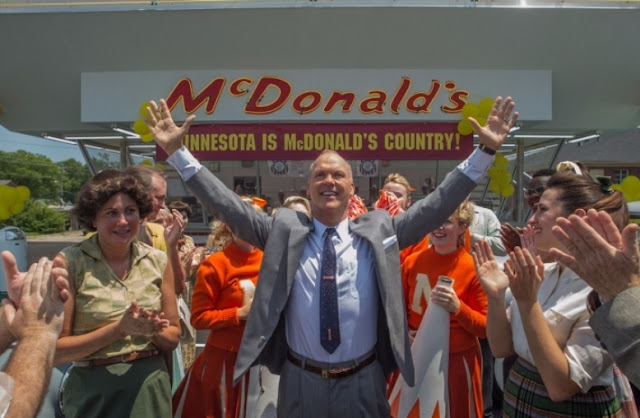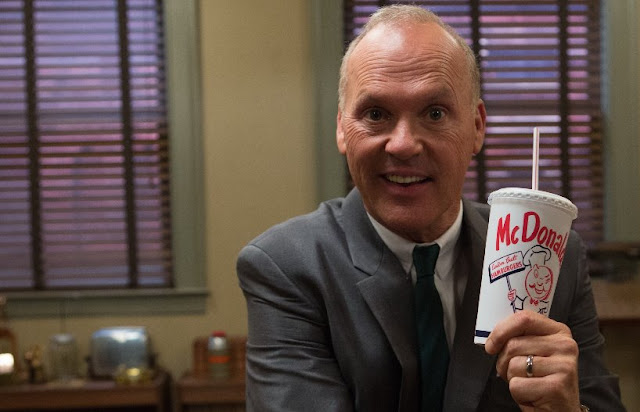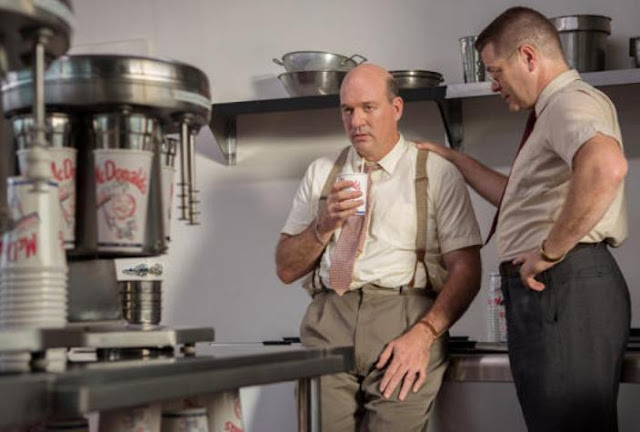By Tanmay Shukla
Featured in IMDb Critic Reviews
Which is the right way—give up the ambitions in order to preserve one’s ethos or obviating the ethos in order to chase one’s dreams? Both are born out of will to a personal sense of fulfillment but the path diverges into contrasting destinies in the modern world.
The Founder is a story told as it is without the addition of spice or gimmick. The drama unfolds in a matter-of-fact tone from which neither portrays the character as a hero nor as a villain but as an ordinary relatable human being. An ambitious middle aged salesman, Ray Kroc who hasn’t been doing well is aiming for more, something big. He listens to old inspirational speeches on a record player to seek motivation after another tough day. The speech talks about persistence as the highest virtue—how the streets are filled with talented unemployed and educated failures. Persistence is Ray Kroc’s motto, it is his belief.
The film opens with Ray trying to sell a milkshake machine. Although he is diligent, the shop owner has made up his mind long ago to not fall for the tricks. The beginning gives no clue of what is to come. We pity Ray for his efforts and Keaton’s mojo makes us start caring about the man early in the movie. After continuously getting rejected, Ray gets a large number of orders for his instant milkshake machines from a fairly unknown diner called McDonald’s. Curious, Ray decides to travel all the way from Missouri to California to check out the diner. When he gets there, he is at once flattered by countless things. Firstly, the name ‘McDonald’s’ fascinates him so much that he associates it with ‘America’. The people happily stand in long queues rather than sulk inside their convertibles in a drive-in. He is amazed by the way how such delicious hamburgers are served to him within 30 seconds, wrapped in a neat disposable package. Ray wastes no time and approaches the two brothers, Mac and Dick, the latter being the younger one, to hear their story and Dick’s self-devised ingenious methods swell Ray with admiration.
Ray comes back again to the brothers, this time with an idea for a franchise. On his way back home, he noticed two ubiquitous things in America—the church with a cross on top and the court with a flag. He saw a pattern there—the golden arches of the McDonald connecting the values, the family, the country. Dick is reluctant to embrace the idea because the franchise he had tried couldn’t maintain the quality standards. Ray however is adamant and approaches the banks to grant him a loan for franchise investment but they deny him partly due to his bad experiences with the bankers in the past when he struggled as a seller of products which were sometimes borderline ridiculous. Finally he gets a loan only after mortgaging his house which her wife learns about much later. After starting his own franchise, he convinces his rich friends to start a franchise of their own too as an investment which they take for granted. Then, in order to generate some substantial profits, he decides to approach the young entrepreneurs who are willing to take risks and work hard for their ambitions and in their company Ray tastes some success. Harry Sonneborn, a financial consultant gives Ray a monumental advice which turns out to be a game changer for McDonald’s as they start owning land instead of leasing it for the franchise under the disguise of a separate company which is not subjected to the contract signed between Ray and the brothers.
While the business is flourishing, Ray gradually becomes distant from her wife Ethel. Laura Dern as Ethel is a supportive and an indulgent partner. She wants more family time with Ray but never insists upon it, allowing Ray to pursue his big dreams without being a hindrance. The on screen time given to Ethel is a lot less than what she deserved and also there are hardly any dialogues between the couple. Ray’s continuous struggle to find a balance between work and marriage is the primary cause for the rapidly increasing distance. Though one still wonders why Ethel is so passive towards her falling marriage and Ray so indifferent to her wife; it is an area left untouched by the writer Robert Siegel. Entering their personal lives would have added an additional layer of drama in the film which is otherwise uniform in tone which wanders around the territory of boredom around the middle. In a business meeting, Ray meets Joan Smith and in the first contact itself they find a natural rapport with each other.
The casting of The Founder is done with precision, especially the three leads each of whom fit into their characters very well. Nick Offerman plays Dick McDonald, a complicated character with expertise. Dick is much smarter than Ray, but he hasn’t in him to go extreme lengths as Ray because his conscience subdues his ambitions. John Lynch like always is impressive as Mac McDonald, the elder brother. He is the sensitive, grounded one who acts as a calm, absorbing figure to control his brother’s temperament.
It is in every conceivable way a Michael Keaton’s film. On his own he carries the whole film from first to the final frame and bestows us with probably his finest ever performance. There is a gradual shift in the personality of Ray from start to finish. To witness such an eventful journey which is not fiction but reality, we tend to embrace all of it—indeed he is very much like us. From a desperate salesman he ascends as an owner of a restaurant chain with a worldwide expanse. Keaton couldn’t have played the role any better. It doesn’t matter what one thinks of Ray in the end, one thing is certain that he is relatable in a human way. Keaton has an aura about him that he can accommodate himself to vastly different personas without ever deceiving us with the stereotype. The transition from start to middle to finish is so subtle and swift that he makes us forget he’s performing.
The few shortcomings one can point out can be traced to the technical department. The whole movie was consciously made in an understated tone which is why it feels kind of low-key without too many highs to it. This might avert such audiences who prefer action over dialogue. The McDonald brothers have no interest to expand their humble diner into a multi-billionaire corporation. All they wanted is to serve quality food to people, to American families. They do so for the pure joy and satisfaction they receive from it. Dick doesn’t want to compromise with the quality for extra profits. He refuses to use instant mix instead of real milk. But in the denouement it’s the brothers who unfortunately succumb under the pressure and influence of the corporation and greed of Ray Kroc who towards the end declares himself the ‘Founder’. Overall, it’s a good watch if the premise interests you.
Rating: 6/10
Readers, please feel free to share your opinion by leaving your comments. As always your valuable thoughts are highly appreciated!
References:
References:
People who liked this also liked...






0 comments:
Post a Comment
Thanks for sharing for valuable opinion. We would be delighted to have you back.